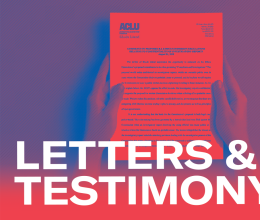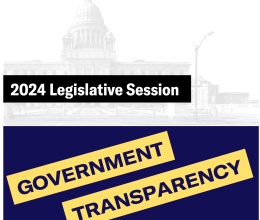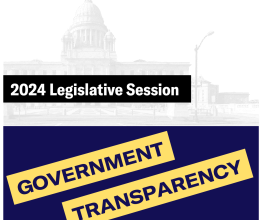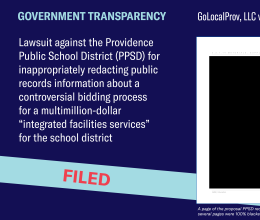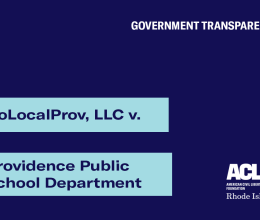Ruling in an open meetings lawsuit brought by the Rhode Island ACLU and the Barrington Times, R.I. Superior Court Judge Brian Stern held yesterday that Barrington School Committee meeting agendas often violated the Open Meetings Act by “patently disregard[ing] the spirit and purpose” of the Act and “the public’s statutorily-protected right to be advised of the workings of its governmental bodies through appropriate notice.” Another portion of the ruling, which upheld the School Committee’s closure of a meeting in 2009 to discuss the merits of instituting a mandatory breathalyzer policy for all students attending school dances, also established significant limitations on what can constitute a valid basis for meeting with legal counsel in executive session.
The lawsuit, filed in August of last year by RI ACLU cooperating attorney Howard Merten, a partner a Partridge Snow & Hahn LLP, raised three major issues: that the school committee unlawfully met in closed session in February 2009 to discuss the breathalyzer issue; that it failed to properly advise the public that the subject would be discussed in executive session; and more generally, that school committee agendas routinely used “vague boilerplate terminology” that failed to provide adequate notice about the items to be discussed at its meetings. In that regard, the lawsuit noted that many of the school committee’s agendas contained such items as “Discussion [of] School Committee Policies,” without providing any specificity of the actual policies that might be discussed at the meeting. Judge Stern agreed that these notices (including the notice for the meeting where the breathalyzer issue was discussed in private) were clearly deficient, and he affirmed the obligation of public bodies to provide notice that will fairly inform the public of their activities. The Judge indicated that he would schedule a further hearing to determine whether the school committee should be subject to fines for engaging in a “knowing and willful” violation of the notice requirements.
The closed meeting itself took place on the same night the school committee heard public comment on whether to institute mandatory breathalyzer testing at school dances. The breathalyzer issue had been a subject of great debate in the town and a few months before the disputed meeting, the ACLU had written a letter raising policy concerns about adopting a mandatory breathalyzer policy. The school committee justified the closed meeting by relying on the OMA’s “litigation” exemption, claiming that the ACLU letter could be deemed a “threat of litigation.” But the lawsuit noted that at the time of the executive session “there was no litigation pending or threatened” and “there was not even a specific policy in place that could have been challenged through litigation.”
A week later, Josh Bickford, editor of the Barrington Times, filed a complaint with the Attorney General about the legality of the school committee’s closed session. However, the Attorney General’s office accepted the school committee’s contention that the ACLU letter was a sufficient basis to close the meeting. The lawsuit argued that “if the Committee’s rationale for convening in executive session is validated, then the exception has swallowed the rule. Any opposition to a proposed public policy could provide the basis for secret debate by elected officials relying on phantom and wholly hypothetical ‘litigation.’”
In his ruling, Judge Stern rejected the school committee’s position that as long as members subjectively viewed the ACLU letter to be a threat of litigation, it could go into closed session. He also held that the Open Meetings Act does not allow public bodies to convene in executive session based solely on the invocation of the attorney-client privilege. However, he concluded that the school committee’s views were nonetheless entitled to deference, and its decision was not arbitrary or unreasonable. The ACLU and the Times are considering an appeal of that aspect of the ruling.
Matthew Hayes, publisher of the Barrington Times, said today: “We were pleased to see Judge Stern recognize the long-standing problem with the School Committee’s boilerplate meeting agendas, but we feel his decision fell short in an equally important area. The School Committee knew well what it was doing when it called an executive session to discuss a letter it received from the ACLU regarding the breathalyzer issue — it was keeping the public out of a public debate.”
ACLU attorney Merten added: “This is an important decision reaffirming the need for public bodies to embrace the purpose and spirit of the Open Meetings Act and not treat its requirements as hurdles to be avoided. Meeting notices are an integral part of ensuring public participation in government and should be meaningful. The Court today also affirmed some important limitations on when public bodies can discuss policy issues in executive session under the cloak of attorney-client discussions. The mechanics of how to implement and enforce these limitations, and the deference afforded to public officials subject to the mandates of the Open Meetings Act, may need further refinement.”


